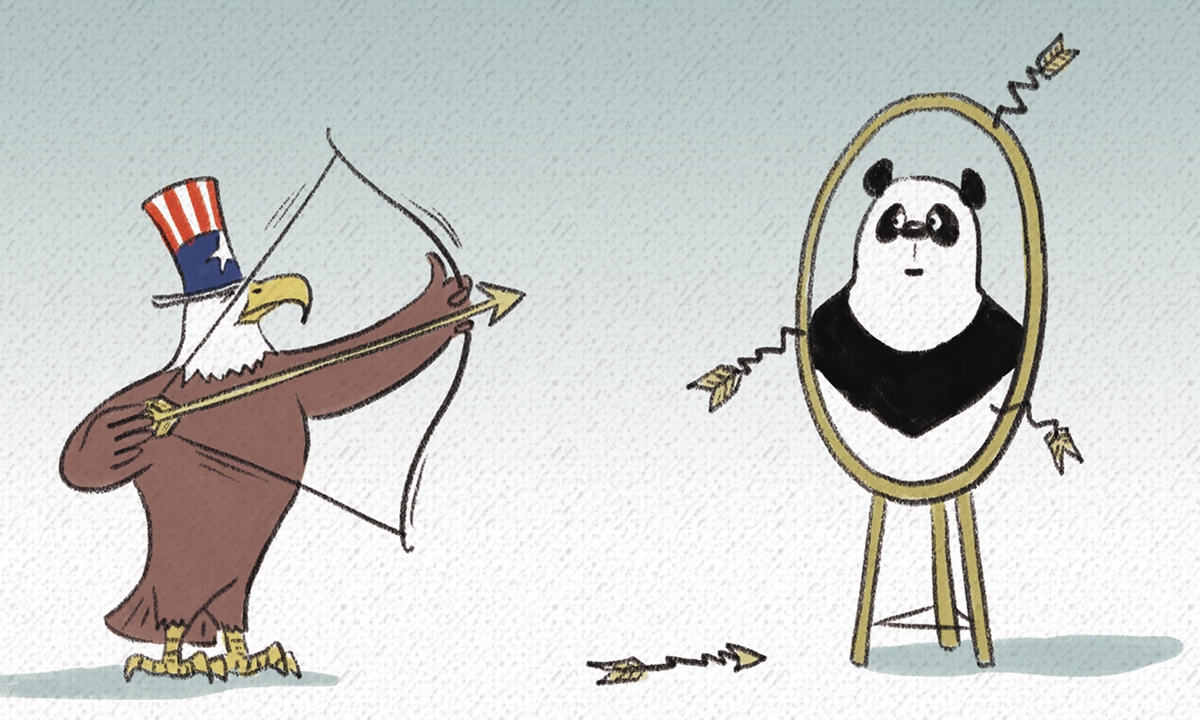
China, US Illustration: Liu Rui/GT
In a Monday article titled "In a topsy-turvy pandemic world, China offers its version of freedom," the New York Times (NYT) said Chinese citizens now have the most basic form of freedom that many of the world's people would envy in a pandemic year - the freedom to move around and lead a normal day-to-day life. This sparked criticism. Critics accused the NYT of "shilling for communist China" with a "glowing piece." Labeling the article as "propaganda," some US elites, such as conservative political commentator Ben Shapiro, even asked: "Did the Chinese government write this?"
The NYT article just told a simple fact that while many countries are still reeling from COVID-19, China has become one of the safest places in the world. It also took a few shots at the US in the article. However, its recognition of China's success in tamping down the epidemic apparently has touched the nerves of some US elites. It seems these elites are too fragile to bear any comparison between China and the US in terms of response to the pandemic.
This is not the first time that a US media report has been criticized as propaganda for China. In July 2020, an article and its author in the NYT who compared the fate of his relatives in the US to those in China during the COVID-19 pandemic came under attack. In April, CNN was accused of "literally publishing Chinese propaganda" by US elites including Senator Josh Hawley and Washington Post columnist Isaac Stone Fish as it said China's PLA Navy has controlled the coronavirus while noting the outbreak of the virus on several US Navy aircraft carriers.
Is the NYT article about freedoms amid the coronavirus a propaganda for China? Chinese readers actually don't quite agree with its viewpoints. Before it put forward the idea that Chinese have the freedom to move around and lead a normal life, it emphasized "citizens of China don't have freedom of speech, freedom of worship or freedom from fear - three of the four freedoms articulated by President Franklin D. Roosevelt." It repeated the cliché that Western media outlets often use to attack China.
Chinese citizens' right to freedom of speech and religious belief is protected by the Constitution and laws. China has over 900 million netizens that are shaping the country's active public opinion. Xinjiang alone has about 24,400 mosques and the number of mosques per capita in China is among the highest in the world. Amid the pandemic, ordinary Chinese people have been well protected while people in Western countries are living in fear of the epidemic.
The NYT article reports the fact of China's anti-virus success, but there is still no shortage of ideological prejudice in it. It's ridiculous that such a piece is regarded as propaganda for China. It makes people wonder what US media outlets like the NYT are supposed to be in the eyes of elites.
Western media outlets are too accustomed to using their standards and definitions to judge freedom. Driven by ideological prejudice, they paint China as an authoritarian and repressive country. Affected by their reports, the US mainstream society lacks a basic understanding and objective evaluation of China, and pathetically, they regard an article with some basic facts about life in China a propaganda.


